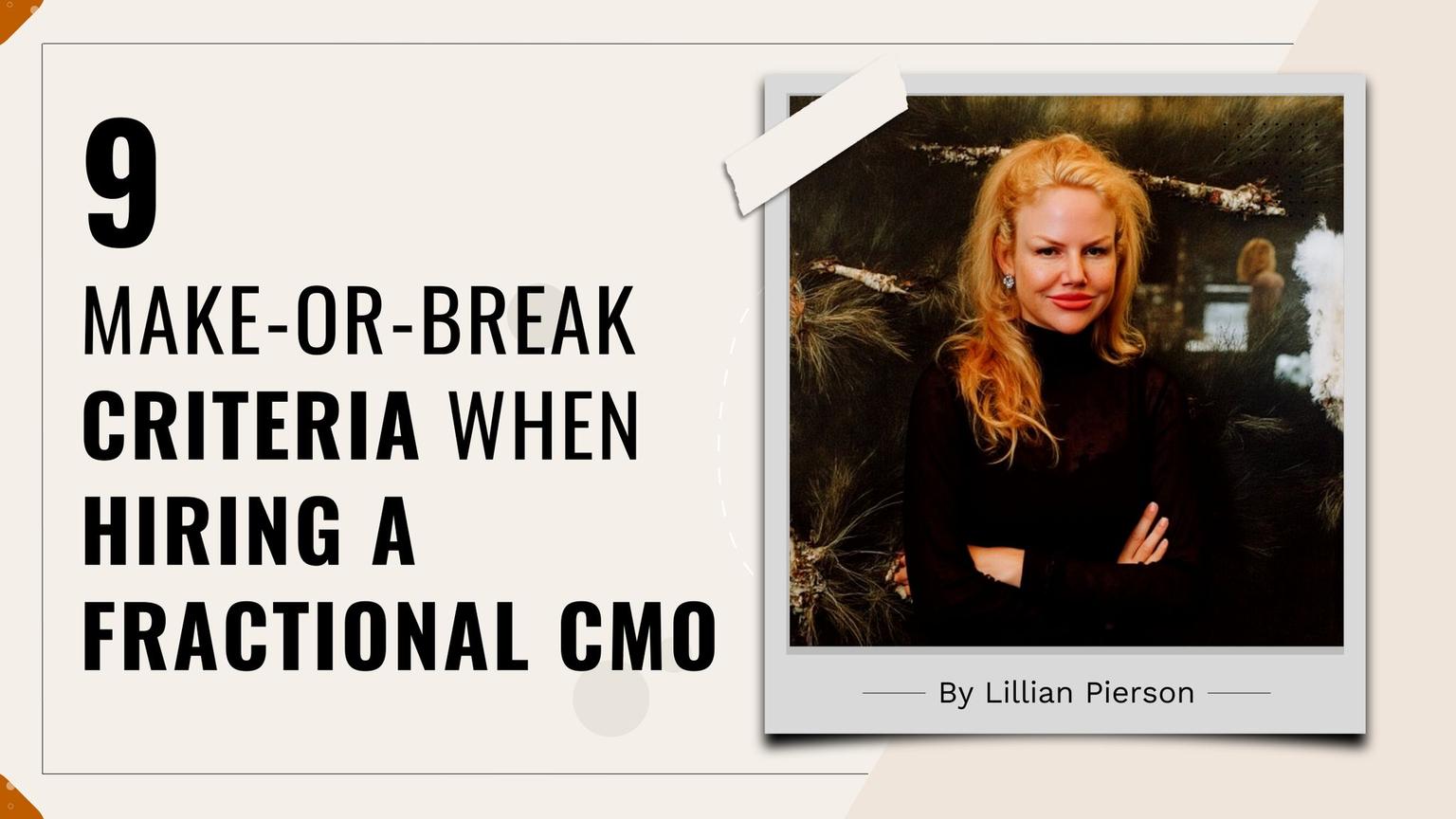If you’re anything like most founders I work with, when your out on the search to find a fractional CMO, you’re probably feeling overwhelmed by the sheer number of candidates out there claiming that they can transform your marketing overnight.
As someone who’s been working as a marketing leader for years, I can tell you that hiring the right person can absolutely make or break your startup’s marketing efforts.
But here’s the thing that nobody really talks about: there are no certifications or regulatory standards in this field, which means many candidates simply don’t have the experience to deliver the results they promise.
On the quest to find a fractional CMO, I’ve watched too many founders make costly mistakes by rushing into these hires without proper evaluation. That’s why I want to walk you through the 9 critical criteria you should use when evaluating candidates:
- Leadership Experience: Look for at least 8 years in marketing, with 5+ years in leadership roles.
- Industry Knowledge: They should understand your product, market, and customer behavior inside and out.
- Cross-Channel Expertise: Proven success managing campaigns across multiple marketing channels.
- Hands-On Skills: Experience in at least 8 out of 10 key marketing areas, like paid media, SEO, and growth marketing.
- Startup Experience: Ensure they’ve worked with startups at your exact stage (pre-revenue, scaling, etc.).
- Execution & Strategy Balance: Ability to plan and execute, not just oversee from the sidelines.
- Team Fit: Strong communication skills to align with all levels of your organization.
- Availability: Confirm they can dedicate enough time to your business.
- Results Tracking: They must back up their claims with measurable results and case studies.
Red Flags to watch for include vague results, lack of budget management experience, and weak references. I’ll show you how to use a scoring system to compare candidates and prioritize those with relevant experience and measurable success.
Hiring a Fractional CMO? Don’t move forward without this checklist.
The Backstory
As always, I’m sharing from my experience here, and trust me, it’s going somewhere important for you as a tech founder.
I’ve been living the tech startup CMO life since 2022. Started as a full-time SaaS CMO, then shifted to the fractional model after my second kid arrived (because let’s face it, I needed the flexibility that comes with not being tied to one company’s conference room all day). All in all? Twenty years of marketing everything from engineering companies to B2B SaaS to B2C and D2C ventures across more verticals than I care to count.
But here’s what’s keeping me up at night lately: everywhere I turn, I’m seeing junior marketers and deep specialists suddenly hanging out their “fractional CMO” shingles. Now, I’m not trying to gatekeep here, but having worked with these folks, knowing what I know about their actual expertise – and more importantly, understanding the breadth of skills you actually need to succeed as a CMO – this trend is creating some serious risks for the entire category.
Why This Should Matter to You
I talk to founders regularly who’ve burned through $1M+ on marketing with absolutely zero return to show for it. Think about that for a second.
That’s not just money down the drain – that’s runway, that’s team salaries, that’s the difference between your next funding round and shutting down.
If the fractional CMO space gets flooded with people who don’t actually have the chops to handle the role, guess what happens? More startups are going to throw serious cash at this supposed “savior class” and get burned. And that doesn’t just tank the reputation of fractional CMOs as a whole – it actively hurts businesses and the people whose livelihoods depend on those businesses succeeding.
The stakes are real, and they’re high. With that being said, today I’m sharing with you the top 9 criteria to check on your hunt to find a fractional CMO for your tech startup.
9 Criteria to Check on Your Hunt to Find a Fractional CMO
When you’re trying to find a fractional CMO, you need to make sure they bring the right skills and experience to the table. As someone who’s been on both sides of these conversations, I can tell you these nine criteria will help you evaluate every candidate effectively. Each one is a simple yes-or-no check. If they don’t meet the standard, they’re probably not the right fit for your business.
1. Marketing Leadership Experience
Here’s what you should look for: at least 8 years of marketing experience, with 5 or more years in leadership roles. But it’s not just about time served. You want to see proven strategic decision-making in action.
When you’re interviewing candidates, ask them to walk you through specific situations where they managed budgets (you want clear figures here) and led teams through tough decisions. Maybe they had to pivot a failing campaign or reallocate budget mid-quarter. If they’ve only executed under someone else’s direction, they probably lack the strategic insight your company desperately needs.
2. Technical and Industry Knowledge
Your fractional CMO should have a rock-solid grasp of your product, market, and customer psychology. For instance, if you’re in deep tech SaaS, they should understand technical nuances of your product enough to communicate them clearly to a sophisticated audience.
Here’s my favorite test for you to try: present a real challenge your company is facing and see how quickly they can identify the technical nuances and market dynamics involved.
The best candidates don’t just nod along – they ask probing questions that show they understand the deeper implications. When you’re trying to find a fractional CMO, it’s candidates like this you want to be looking out for.
3. Cross-Channel Strategy Success
A capable CMO has a track record of successfully developing and overseeing complex cross-channel strategies. You want someone who can explain how they’ve driven real revenue growth across multiple integrated marketing channels, supported by real data that shows it actually worked.
When you find a fractional CMO candidate, always ask candidates to walk you through a campaign they led from start to finish: strategy, execution, optimization, and results. They should also be able to discuss attribution models and explain how they adjusted tactics based on performance data. Avoid candidates who only have deep expertise in one or two channels; a true CMO needs to think holistically.
4. Hands-On Marketing Skills
This is a big one that often gets overlooked. When you’re trying to find a fractional CMO, always make sure that they have deep hands-on experience in at least 8 of these 10 areas:
- Partnerships
- Paid Media
- SEO/LLMO
- Social Media
- Event Marketing
- Email Marketing
- Product Marketing
- Growth Marketing & Funnels
- ABM
- Messaging & Positioning.
This shows they understand the nuances enough to build growth strategies that are both feasible and scalable. Find a fractional CMO that can dive into the details and understand your systems inside and out (not just delegate everything).
Ask for real examples of campaigns they’ve personally worked on in these areas. Look for confidence in discussing specific tools, tactics, and outcomes. If they get vague or start name-dropping tools they’ve “overseen” rather than used, that’s a red flag.
5. Startup Experience at Your Stage
Here’s something many founders miss: not all startup experience is the same.
If you’re pre-revenue, you need someone who’s built marketing foundations from absolute scratch. If you’re scaling, find a fractional CMO who’s managed hypergrowth and tackled the operational challenges that come with it.
When you’re interviewing, ask about their experiences with startups at a similar stage to yours. The challenges they describe should make you think, “Yes! That’s exactly what we’re dealing with.”
If all their experience is all from later-stage companies, they might struggle with the resource constraints and foundational work your stage requires.
6. Strategy and Execution Balance
Your fractional CMO should have experience driving growth through the right motion for your business – whether that’s sales-led growth (SLG), product-led growth (PLG), or partner-led sales (PLS).
It’s important to find a fractional CMO that understands how to balance strategic planning with hands-on execution, especially in early-stage companies where foundational systems often need to be built from scratch.
Be very cautious of candidates who only want to operate at a high level without rolling up their sleeves. In a fractional role, you need someone who can both set the strategy and help execute it.
7. Team and Culture Fit
A strong CMO knows how to communicate effectively across all levels of your organization. They should be able to explain complex marketing strategies clearly to you as the founder, collaborate seamlessly with sales, and provide clear guidance to junior marketing staff.
Their ability to adapt their communication style for different stakeholders is absolutely critical for building trust and alignment. Test this during interviews by asking them to explain the same concept to you as if you were a technical founder (that you are), then as if you were a non-technical board member.
8. Availability and Conflicts
Fractional CMOs often work with multiple clients, so you need to confirm they have enough bandwidth for your business. Ask direct questions about their current workload, how they allocate their time across clients, and whether they have any potential conflicts of interest with competitors.
The best fractional CMOs are usually pretty selective about their client mix to avoid spreading themselves too thin. Find a fractional CMO that’s able to give you specific hours per week and be clear about their availability for meetings and urgent issues.
9. Results Tracking and Honesty
Finally, a good CMO should have clear methods for tracking success and be completely transparent about their performance. They should provide detailed case studies, solid references, and specific metrics from previous work – conversion rates, cost per acquisition, revenue growth percentages, the works.
Find a fractional CMO who’s open about both wins and lessons learned. Marketing is all about testing, iterating, and improving. If they can’t back up their claims with hard data, or if everything they’ve done was supposedly a massive success, consider it a major red flag.
Warning Signs to Avoid
While this checklist helps you identify strengths, it’s equally important to stay alert for warning signs that reveal critical gaps. These red flags can signal that a candidate lacks the experience or professionalism required for executive-level marketing leadership.
Missing Required Experience
One of the clearest warning signs is when a candidate doesn’t meet the basic experience requirements. A limited or overly specialized background can put your marketing goals and budget at serious risk.
Be especially cautious of candidates whose experience is confined to large corporations where they had full support teams. A fractional CMO must thrive in a self-reliant, hands-on role, often juggling multiple responsibilities. If they’ve never built systems from scratch or managed with limited resources, they’re going to struggle with the demands of startup life.
Another major red flag is lack of budget authority experience. If a candidate hasn’t had full control over marketing spend, they may not grasp the strategic weight of allocating resources effectively. Be sure to ask about the largest budgets they’ve managed and the specific outcomes they delivered.
Unclear or Fake Results
Specific, measurable results are absolutely non-negotiable when you’re looking to find a fractional CMO. Vague claims without supporting data should immediately raise concerns. A capable fractional CMO should be able to share detailed case studies, complete with metrics, timelines, and clear outcomes.
Be cautious of candidates who dodge questions about references or examples of their work. While confidentiality is a legitimate concern, seasoned professionals know how to share anonymized case studies or discuss their methodologies and results without compromising client privacy.
Also watch for inflated or overly ambitious claims. If someone boasts about achieving 500% growth rates or rescuing failing companies in impossibly short timeframes, dig deeper. Ask for context: what were the team size, budget, and market conditions that contributed to these results? Unrealistic claims rarely hold up under closer scrutiny.
Bad References or Feedback
To find a fractional CMO that’s worth their salt, reference checks can be important – and what isn’t said can be just as revealing as what is.
Look for patterns in feedback that point to problems like poor reliability, weak communication, or lack of follow-through. If multiple references mention missed deadlines, overpromising, or difficulty working with the candidate, these are serious red flags, especially for a fractional role where trust and autonomy are absolutely key.
An inability to provide recent references is another major concern. If a candidate can’t connect you with anyone from their last few roles, it might suggest they left on bad terms or failed to meet expectations. Find a fractional CMO that maintains solid relationships with past clients who are willing to vouch for them.
Finally, be wary of candidates who only provide references from subordinates or peers. While team feedback is helpful, you need insights from executives they reported to – people who can speak to their strategic thinking and leadership impact.
sbb-itb-e8c8399
How to Compare Multiple Candidates
You’ve looked tirelessly to find a fractional CMO, and now you have a handful of candidates. Congratulations! The next step is determining which one aligns best with your specific business needs. This process relies on structured evaluation methods to ensure fairness and consistency throughout your decision-making.
Create a Scoring System
A scoring matrix can help transform subjective impressions into clear, actionable data. Start by listing each candidate’s name in a spreadsheet, with columns for the nine evaluation criteria you’ve established. This setup allows you to quickly see how candidates compare and where they stand out or fall short.
Use a 1-to-5 scale for each criterion, where 1 indicates the candidate didn’t meet the requirement, and 5 reflects exceptional performance. The key is documenting specific evidence for each score.
For example, instead of simply assigning a “4” for technical expertise, you might note: “Managed marketing for three SaaS platforms, has a solid understanding of API integrations, and articulates product-led growth metrics fluently.”
These detailed notes are invaluable when making a final decision or explaining your choice to other stakeholders.
This scoring system also helps you identify patterns and find a fractional CMO that’s at the top of the pack. If most candidates score poorly in areas like startup experience at your current stage, you might need to either broaden your search or adjust your expectations. On the other hand, if several candidates excel in non-critical areas, you can refocus on the criteria that truly matter for your specific situation.
Prioritize and Adjust Scores
To ensure the scores reflect your immediate priorities, weight the criteria based on your current needs. For example, an early-stage startup might prioritize hands-on execution skills, while a Series B company could value strategic leadership more heavily. Multiply each candidate’s score by the assigned weight to calculate a total that better aligns with your goals.
Don’t overlook cultural fit either. Add a column to track how well candidates align with your team’s communication style, responsiveness, and overall dynamics. A technically skilled candidate who disrupts team cohesion can be just as problematic as someone lacking the necessary experience.
Watch for Red Flags
Keep a separate record of any red flags, such as exaggerated claims or concerning references. Even a high-scoring candidate may not be the right fit if they raise significant concerns about their reliability or integrity. This dual-layered approach ensures that your scoring system doesn’t overshadow critical judgment calls.
Involve Stakeholders
Whenever possible, bring in other team members to contribute to the evaluation process. Your head of sales or product leader might notice strengths or weaknesses you missed. Their perspectives can provide a more well-rounded view of each candidate, leading to smarter hiring decisions when you’re trying to find a fractional CMO.
Conclusion: Making the Right Choice
To find a fractional CMO with the world-class talent your startup needs, you need a disciplined, step-by-step approach. The nine criteria in this checklist are designed to help you avoid costly hiring mistakes that could drain your marketing budget and slow your progress.
Experience matters way more than flashy promises. A fractional CMO without at least eight years of marketing experience and five years leading teams simply won’t have the depth needed to navigate complex growth challenges.
Likewise, if they lack hands-on expertise in at least eight of the ten key marketing areas, they’ll leave critical gaps in your strategy.
Your scoring system should now highlight candidates who meet these essential qualifications. Pay close attention to those with a proven track record in your specific growth motion – whether it’s product-led, sales-led, or partner-driven growth. But remember, numbers alone don’t tell the whole story. You need to combine these quantitative insights with qualitative factors for a well-rounded evaluation.
Cultural fit and availability are just as important as technical expertise. Even the most skilled fractional CMO won’t be effective if they’re stretched too thin or don’t align with your team’s communication style. The best fractional CMOs are selective about their workload, ensuring they can give clients the focus they deserve.
Don’t ignore red flags, even if a candidate’s scores look impressive on paper. Overblown claims, weak references, or vague answers can point to deeper problems. Remember, this is a leadership role, and the decisions they make will shape your company’s strategic direction.
When you find a fractional CMO that can truly drive measurable growth, that pays for itself many times over. By sticking to these criteria, you’ll find a marketing leader who can genuinely accelerate your progress.
Take the time to make the right choice. Following these guidelines will protect your business and set the stage for sustainable growth. Keep an eye out for those warning signs I mentioned – choosing the right fractional CMO can be the difference between breakthrough success and wasted resources.
Ready to Talk?
Look, I check all these boxes and have hundreds of pages of case studies that prove it. But here’s the thing – as a solopreneur, I can only work with a handful of clients at any given time, which means I have to be pretty selective about who I take on.
That said, if you’re a tech startup founder who needs genuine executive-level marketing support (not just someone to run your ads or write your blog posts), I’m always up for a conversation. Drop your details in this form and let’s look to see if we’re a fit.
No pitch decks, no hard sells – just two people figuring out if there’s a way I can help you avoid becoming another cautionary tale about wasted marketing spend.
FAQs
What challenges might arise when hiring a fractional CMO instead of a full-time CMO?
Hiring a fractional CMO does come with its own set of challenges. Since they usually juggle multiple clients, their availability might not always align perfectly with your needs. Plus, they may not be as immersed in the day-to-day workings of your company, which can make it harder for them to fully integrate with your team or align with your company’s culture.
Another potential drawback is their level of commitment. A fractional CMO isn’t dedicated solely to your business, which means they might not always provide the immediate responsiveness or hands-on involvement you’d get from an in-house CMO. This could slow down decision-making or delay action on urgent projects. That said, many of these issues can be addressed with clear communication and setting well-defined expectations from the start.
How can a startup evaluate if a fractional CMO is a good cultural fit?
When considering if a fractional CMO is the right fit for your startup’s culture, it’s essential to ask meaningful questions that dig into their values, work habits, and motivations. For instance, you might ask what drives their passion for their work or how they define and contribute to a thriving company culture. Questions based on real-life scenarios can also shed light on how they handle challenges and collaborate with others.
You’ll also want to explore how well their approach aligns with your company’s core values. Discussing specific examples from their past experiences – especially in environments similar to yours – can offer clarity. Honest, open conversations and thoughtful behavioral questions can reveal whether their personality and style will mesh well with your team.
How can I verify the experience and results of a fractional CMO candidate?
To evaluate a fractional CMO candidate’s experience and track record, start by diving into their portfolio and case studies. Look for measurable achievements like improved website traffic, boosted lead generation, or increased revenue. Specific examples showcasing their expertise and the impact of their work are key indicators of their capabilities.
Next, connect with their past clients or employers for references. Ask questions about their work approach, strategic insights, and ability to deliver on goals. This kind of direct feedback can offer a deeper understanding of their reliability and performance.
Finally, verify their claims by comparing them with testimonials or documented successes. Ensuring their results are backed by tangible proof will give you the confidence to determine if they’re the right fit for your business.
Related Blog Posts
- When Should Startups Hire a Fractional CMO?
- How Co-Marketing Boosts B2B Tech Partnerships
- Best Fractional CMOs for Tech Startups: 6 Strategic Leaders Driving 100x Growth (2025)
- Best Fractional CMO Companies for AI Startups: The Need for a Different Breed




